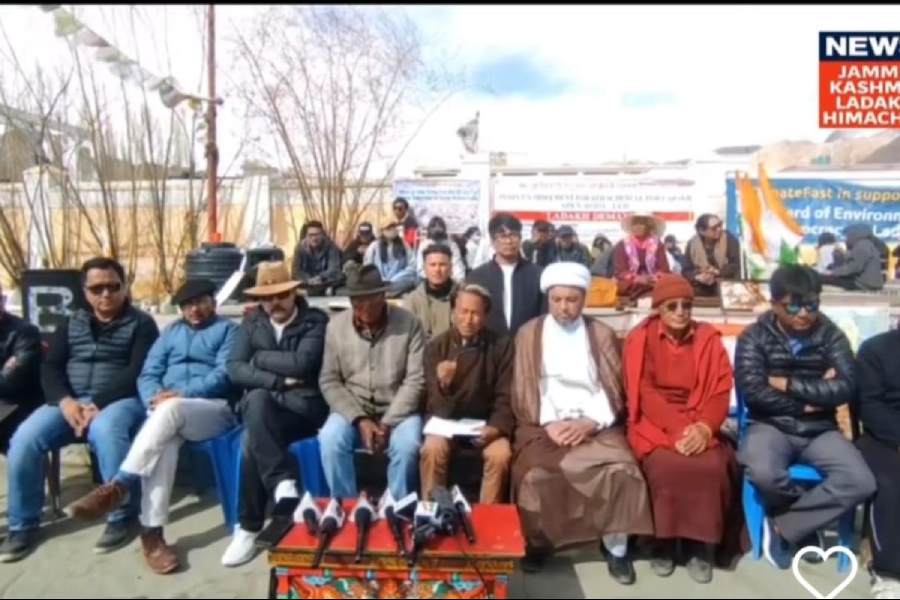Ladakh’s fasting climate activist Sonam Wangchuk on Saturday claimed the region was being converted into a war zone to prevent Sunday’s “border march” by residents, meant to expose the extent of alleged Chinese intrusions and land takeover by Indian corporate groups.
He asked the government to consider the possible impact on national security if the people’s emotions were hurt.
Wangchuk advised people against travelling to Leh for the march, citing the security beef-up. But there was no word on whether the march had been called off.
The authorities have banned assemblies on Sunday and ordered a reduction in Internet speed.
Wangchuk recently observed a 21-day fast to press for statehood and special status for Ladakh under the Sixth Schedule of the Constitution. He is currently on a fresh three-day fast.
“Leh is being turned into a war zone with disproportionate force, barricades, smoke grenades. Attempts to arrest peaceful youth leaders, even singers, continue. Seems they want to turn a most peaceful movement violent & then brand Ladakhis as anti-nationals,” Wangchuk said in a post on X.
“Govt seems worried only about Ladakh’s effects on their votes and on mining lobbies... not the people here nor even national security.”
In a video accompanying his post, Wangchuk, who has become the face of the Ladakh agitation, said the region was extremely sensitive because it bordered China.
“All prominent leaders in the country, particularly military leaders, experts, are saying that Ladakh is very sensitive, is on the border, but the government is not worried about the sensitivity of the border (and if) it hurts the emotions of people, how will it impact the national security,” Wangchuk said in the video.
“It appears they are neither concerned about national security, nor soldiers, and not in the least the Ladakhis…. They are creating such a frightful environment.”
The Leh Apex Body --- a collective of mainly Buddhist organisations that is campaigning for special status for Ladakh along with the Kargil Democratic Alliance – had announced the “border march” to Changthang on the Chinese frontier.
The objective is to highlight the condition of shepherds who are allegedly losing land to Chinese incursions in the north and to Indian corporate groups in the south.
Wangchuk said police had picked up some Ladakhis near a protest site on Friday evening and forced them to sign a bond (promising not to participate in gatherings or make statements).
He said the “bond thing” was stopped under pressure from leaders of different religious groups who swarmed the camp and warned that such police action could disturb the situation.
Wangchuk said the administration was losing control over its own personnel in the civil and police administrations as they, in their hearts, supported the agitation.
The security build-up is reported to resemble, to an extent, the clampdown in the Valley following the 2019 scrapping of Jammu and Kashmir’s special status.
Leh district magistrate Santosh Sukhadeve on Friday proclaimed that no procession, rally or march should be held without his prior approval.
He said the Leh senior superintendent of police had reported intelligence about a possible breach of peace and public tranquillity in the district.
“No one shall use the vehicle-mounted or other loudspeakers without prior approval from the competent authority. No public gathering without prior approval of the competent authority shall be allowed,” the district magistrate’s order said.
“No one shall make any statements which have the potential to disturb communal harmony and public tranquillity and which may lead to law-and-order problems in the district.”
The additional director-general of police, Ladakh, S.D. Singh Jamwal, has ordered the scaling down of Internet speed and mobile data services of 3G, 4G and 5G connections as well as public 5G Wi-Fi facilities to 2G within 10km of Leh city for 24 hours from 6pm on Saturday.
Leh Apex Body leader Chering Dorjey said the restrictions were an “overreaction” and a result of “some misunderstanding” as the protesters had no intention of violating the law.
Wangchuk said the restrictions were proof that the authorities had something to hide.
“Our request is not to spread unrest in the name of peace. This is a very sensitive region and we always cared for the country,” he said.










